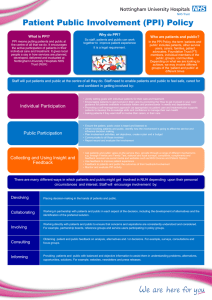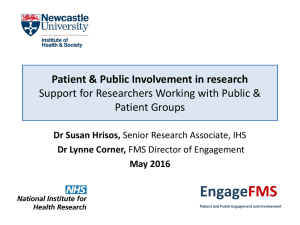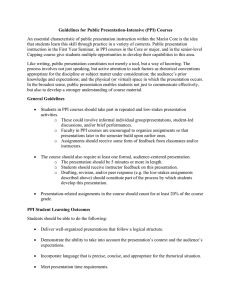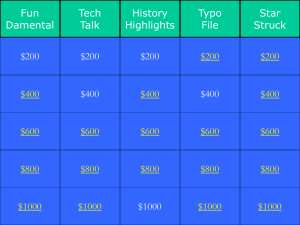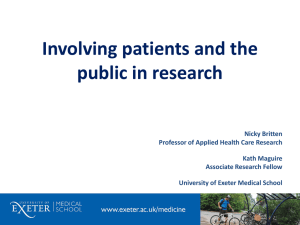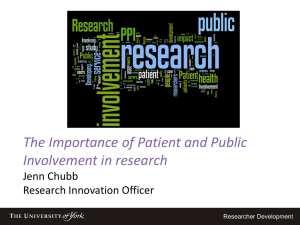Patient & Public Involvement in research Groups Susan Hrisos, Senior Research Associate
advertisement
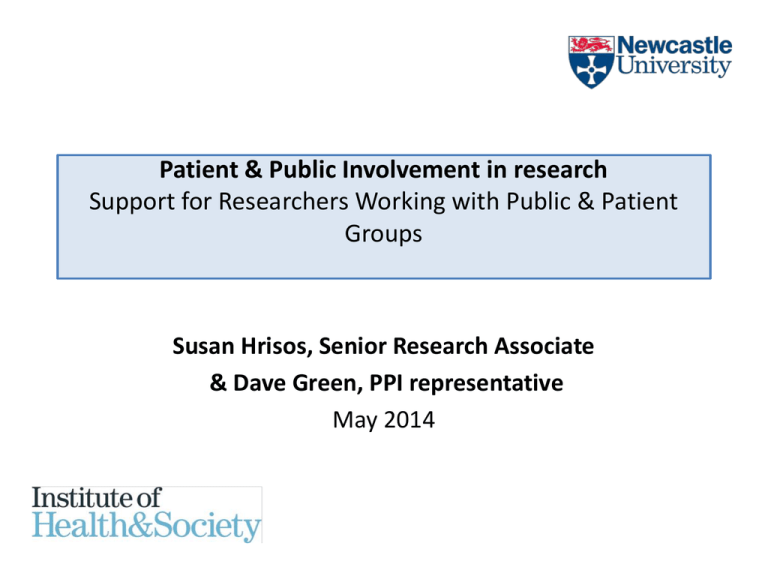
Patient & Public Involvement in research Support for Researchers Working with Public & Patient Groups Susan Hrisos, Senior Research Associate & Dave Green, PPI representative May 2014 Format of session • Introduction to Patient & Public Involvement in Research • Experience of ‘doing’ PPI – Researcher – PPI representative • Interactive session – Small group work Patient & Public Involvement (PPI) • Huge increase in the involvement of patients in improving their health & healthcare in recent decades – Examples: shared decision making; self-management of chronic illness; development of healthcare policy, clinical guidelines & patient literature • Evidence of benefit from involvement in healthcare: – active participation during consultations is associated with better health outcomes (Kaplan 1989; Kaplan 1996) – increased involvement improves aspects of medical care (Atkin 1998; Liaw 1996) – involvement improves treatment compliance (Bibowski 2001) PPI in improving Research • Historically patients & public have not had a large influence on research prioritisation or commissioning, and have not been involved in the research process • Research can seem irrelevant to patient & public needs • Dissemination of findings to take too long Patient & Public Involvement in Research PPI has become an important part of research activity & is supported by government & health policy – NHS Research Governance Framework (2010): patients should be “active partners” in the research process – INVOLVE: Unique national advisory group that promotes patient & public involvement in research, supported by NIHR Central Commissioning Facility. (INVOLVE www.invo.org.uk) Expectation of PPI contribution that goes beyond “tokenism” I.e. To have a more meaningful & identifiable role, e.g. advising on research proposals; assisting in project design INVOLVE • Unique national advisory group that promotes consumer involvement in research – Supported by NIHR Central Commissioning Facility • “Involvement” = an active partnership between public & researchers in the research process rather than the use of people as research “subjects”. (INVOLVE definition. www.invo.org.uk) – rationale for PPI is the production of research that will • be more relevant to people & more likely to be used • reflect the needs & views of the public • be more likely to produce results that can be used to improve practice and social care – Promotes involvement in all aspects of the research process, including • • • • Design of questionnaires & topic guides Preparing patient information Conducting interviews & focus groups Analysing transcripts Learning from experience From novice to expert in 3.5 years. PPI, research and learning curves Reflections from the “Improving Patient Safety Project” Susan Hrisos Dave Green Senior Research Associate Patient Participant & PPI research team member This is independent research funded by the NIHR under its Programme Grants for Applied Research scheme (RP-PG-0108-10049). The views expressed in this presentation are those of the author(s) and not necessarily those of the NHS, the NIHR or the Department of Health. NIHR Patient Safety Programme: “Improving patient safety through the involvement of patients” (Programme Lead: Prof. John Wright. Academic Lead: Prof Ian Watt) Project 2: Bradford Patient error Project 1: Bradford reporting system Patient measure of Project 3: Leeds – Lead: Prof. Gerry organisational Armitage Patient-centred safety training – Lead: Prof. Rebecca programme Lawton – Lead: Prof Vikram Jha Project 4: Newcastle Direct patient intervention to reduce their risk of harm – Lead: Prof. Richard Thomson Core focus: Development of userinformed approaches to improving patient safety. Programme PPI: Steering Structure Annual Steering Seminar 2010 Programme research Day 2012 Research stream within PS Conference 2013 Scrutiny committee Patient Panel meeting 6 monthly 3monthly informal meetings Website & email fora Newsletter Panel Chairs Scientific Steering YQSR group meeting 3 monthly Progress meeting 3 monthly Project 1 team meeting 2 monthly PPI ‘pre-team meeting’ meeting Ad Hoc interim PPI meetings ‘Business ‘emails ‘Maintenance’ emails Dissemination activities Project 4 team meeting 2 monthly Project 4 team meeting 2 monthly Project 4 team meeting 2 monthly Newcastle Project: Co-design Newcastle Project: ‘Extra-curricular’ PPI Assistance with patient recruitment for interview Participant observation in a patient focus group Analysis of focus group transcript Co-facilitated a creative thinking workshop with PPI peers Development & design of ThinkSAFE intervention materials Local & national dissemination of study & developments Piloted patient focussed materials & data collection measures Interactive Session Research Small group exercise Your seedling research idea is awaiting “involvement nitrate” Task One (10 mins): As a group … • Discuss your research projects. • Identify who might be your key stakeholders. Think about … • Who do you need to involve & when? • Where are they in the bigger picture? • Why are they important? Place your stakeholders on the diagram Small group exercise #1 Task Two (5- 10mins): Imagine that you already have a “Dave” on your research team … • What might his role be in enhancing stakeholder engagement & involvement in your research? • How can he help feed your research with their perspective ? • What research activities might he contribute to? Place “Dave” on your diagram where you think he has a role to play. Write down what this role is at this place. Task Three (5mins per group): Feedback on one aspect of “Dave’s” potential PPI contribution Research Cycle INVOLVE http://www.invo.org.uk/posttyperesource/where-and-how-to-involve-in-the-research-cycle/ Task 2 In small groups discuss: • What might involvement look like at the different stages of the research cycle? – How have/would you go about involving people? – Who have/would you involve? – Why involve - what impacts do you anticipate? Prepare feedback on: • Proposed PPI involvement at different stages • Anticipated impact relative to proposed involvement Feedback to full group (2-3mins) Thank you! Some challenges … Patient Panel Group dynamics & cohesion - variation in commitment Communication between members between meetings Expectations & clarity of PPI role PPI understanding of research process & methods Researchers Inter-personal dynamics – managing relationships Communication between meetings Balancing PPI preferences for level or type of involvement Managing expectations & having clarity of PPI role Concerns about undermining research quality & rigour Additional work load/demands on time Some solutions … Clarity of roles, expectations: Terms of reference for PP & researchers PPI Mentor PP Training: Research process Research methodologies Facilitating communication: PP newsletter; PP website forum, PP email forum Informal ‘coffee morning’ meetings Increased contacts with researchers Accepting that we might not always get it right
